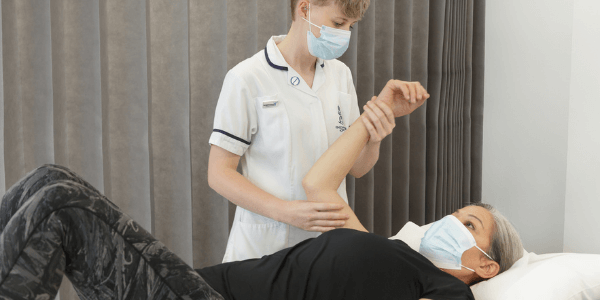Health Hub
6 top tips to help recovery after your shoulder replacement

A shoulder replacement can be a life-changing operation and in 2019 there were over 7000 carried out in the UK alone. It can significantly improve your quality of life and can help with persistent shoulder pain that can stop you doing the things you love.
If you’re considering shoulder surgery, it’s important to be prepared and know what to expect during your recovery period, as well as making some practical arrangements before your operation.
Consultant Orthopaedic surgeon and shoulder specialist at King Edward VII’s Hospital, Mr Addie Majed, has outlined six ways to help recovery after your shoulder replacement.
What preparations can I make before my surgery?
In preparation for your surgery you aim to stop smoking if you smoke, lose weight if you are overweight (and you may wish to consult with a dietician or your GP if you have a high BMI), and remaining active by doing regular exercise. It is also important to get rest and good quality sleep.
You may be invited to a pre-surgery ‘joint school’ to educate and prepare you on the post-operative period, prior to your joint replacement.
You should consider preparing your home environment prior to surgery, taking into account that for a period whilst your arm is immobilised in a sling, activities of daily living may be harder using one arm. The physiotherapy team will work with you to consider the positioning of your appliances, how you will bathe, furniture positioning and accessing your PC.

How long will it take to recover from a shoulder replacement?
The pain you are suffering from shoulder arthritis often will disappear immediately post surgery. However, you may have discomfort from the surgical procedure which can last several weeks and you will be discharged with pain killers. Most patients find their pain has subsided between 6-12 weeks.
Depending on your surgeon, you may awake with a drain (a plastic tube) from the shoulder joint to remove any excess blood so as to prevent a blood clot (haematoma), and this is usually removed day 1 after surgery. You will have routine blood tests and an X-ray before discharge. Most patients remain in the hospital for 1-3 days but your recovery speed will depend on multiple factors, including your age, fitness level and the nature of your procedure.

How long does it take to recover from shoulder replacement surgery?
Sleep, washing and dressing after your shoulder replacement
The therapy team will review and advise you on your arm position during daily activities including at rest and sleeping. However, you should support your shoulder with a pillow underneath the arm when asleep. You may wish to wear loose clothes that button at the front or that are easy to put on and take off. Once you’re dresses you can wear your sling over the top.
You must keep you wound dressing dry for 10 days after surgery, until your wound has been checked. While you still have wound dressing after your shoulder replacement it’s recommended you don’t get fully under the shower or bath and try towel bathing.

Rehabilitation after your shoulder replacement
The therapy team will review and advise you on an exact rehabilitation programme and follow up will be arranged for you. You should expect to be wearing a sling 6-8 weeks after your shoulder replacement.
Depending on the type of surgery you have had, you must avoid external rotation for the first 6 weeks after surgery, your surgeon and physiotherapist will explain this at the time of your surgery. You will be encouraged to start early active movement as part of your post surgery exercise programme to avoid stiffness and obtain the best possible outcome.
When can I travel after my shoulder replacement?
You can usually drive at approximately 8 weeks and restart your leisure activities depending on progress with your physiotherapy team.
Whilst the current level of evidence is limited, it is advised that you should avoid flying for 2 weeks post surgery to prevent a blood clot in your leg (Deep Vein Thrombosis) which can migrate to your lung (Pulmonary Embolism) which can be extremely dangerous. You may also find it uncomfortable sitting in aeroplane seats for too long.
Returning to your hobbies and work
Gentle exercise such as swimming breast stroke can be started at 6 weeks after your shoulder replacement and golf after 3 months. You will be advised to avoid racquet sport for 3 months if your dominant arm is the non-operated side and a minimum 6 months if you had your dominant shoulder replaced. As long as you take frequent breaks you can return to low range gardening in 3 months.
You will need to take a few weeks off work, approximately 4-6 weeks from a sedentary (desk based) job, although typing may be difficult. Most improvement occurs at approximately six months, but it can take 18-24 months to fully recover from this kind of surgery. If you have a manual job, your surgeon will discuss this with you in your initial appointments as part of the clinical decision making process.
Find out more about our Shoulder Assessment Packages and Specialist Shoulder Unit
Article Sections
Latest Hospital News
Should you wish to speak to our press team, please visit Press Enquiries




